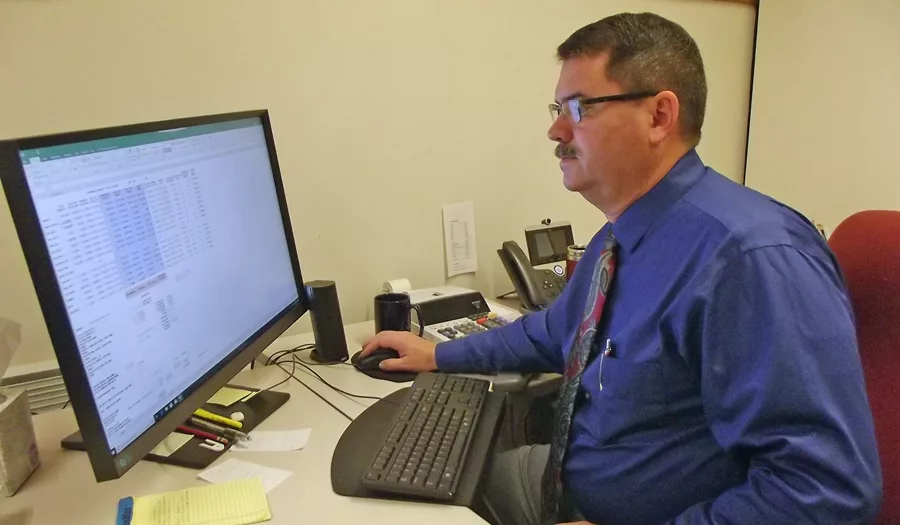
Home » Assessor anticipates decrease in property tax bills
Assessor anticipates decrease in property tax bills

January 14, 2019
Despite a higher state school tax levy in 2018, families in Eastern Washington may see some relief on their property tax bill this year.
That’s because the state collected more than it anticipated, and to alleviate the tax burden for 2019, the state rate of $2.70 per $1,000 of assessed property value will drop to $2.40-per-$1,000.
The state rate is still higher than what taxpayers saw prior to 2018. However, Part 2 of House Bill 2242, which was passed by the state Legislature in 2017, reduces the collection of local maintenance and operations levies to $1.50 per $1,000 of assessed value. It goes into effect this year.
School districts with voter-approved multi-year M&O levies will see a reduction on their tax bills starting in February.
“The M&O (in Pasco) was $3.95, and it’s going to $1.50, so it’s a significant reduction,” said Peter McEnderfer, who became the newly elected Franklin County assessor when Steve Marks retired at the end of 2018.
This year, M&O levies will be called enrichment levies, and in Kahlotus, for example, the school district will get $1.05-per-$1,000 to $1.10-per-$1,000, McEnderfer said. Capital facility levies will not be considered an enrichment levy.
While on the surface it sounds like the reduction in Part 2 of the house bill will be a financial loss for local schools, thanks to state dollars generated from areas such as King County, a revenue surplus will help smaller districts in Benton and Franklin counties, which is what the house bill was intended to do.
“In general, the eastern rural side of the side benefited more,” McEnderfer said. “We’re anticipating most people will realize some kind of relief this year in their tax bill.”
The Washington Policy Center, a nonprofit, independent think tank, noted that the greatest financial impact will be felt in the state’s most populous county. However, King County is closely followed by Snohomish and Pierce counties. Paul Guppy, the center’s vice president for research, noted property taxes are increasing in King County by an average of 17 percent, adding about $800 in taxes on a median-value home estimated at $509,000. The higher tax burden in those counties will result in a cut in household income for nearly every family as lawmakers sought to address education spending.
Washington’s constitution guarantees a child a fully funded basic K-12 education, but seven years ago the state’s Supreme Court determined Washington was not meeting its obligation and required the Legislature to produce a funding plan. This decision is known as the McCleary ruling.
“Of course, elected politicians of both parties want to respond and say, ‘We’re providing resources for schools,’ ” Guppy said. “And that’s how the Legislature responded, by increasing state property taxes.”
Guppy went on to note that the state added $4 billion to its budget to address the issue. There are almost 300 school districts in the state, and Washington’s budget is $18 billion for public education over a two-year cycle. That equates to about $13,000 per student on average per year.
“Public officials are not sensitive on how the tax tends to hit individual people. The way they operate, they look at the top line numbers. They’re also trying to respond to pressures,” Guppy said. “They want to be able to signal, ‘We are funding schools.’ But unemployment is low and Washington in particular is having a tech boom. The Legislature is seeing a ton of money come in.”
Guppy said voters have expressed concerns to politicians about property tax increases, and there could be a future ballot measure for a property tax cut. However, the Washington Policy Center said the government might propose a capital gains tax or a carbon tax combined with relief on property tax.
School taxes equate to about 65 percent to 75 percent of a taxpayer’s property tax bill between state rate — Part 1 on a person’s bill— and Part 2’s enrichment levies.
Property taxes also include dollars for fire districts, mosquito control, county tax, city tax, water control districts and libraries, for instance.
“In a town with a port, there will be some kind of port tax,” Guppy said. “Most of those — called junior taxing districts — those are pennies per $1,000 of value.”
Pasco’s 2018 tax rate is $1.75 per $1,000 of assessed property value.
In Kennewick, it’s $2.17-per-$1,000, and in Richland it’s $2.98-per-$1,000, according to Benton County Assessor’s Office staff.
Benton County Assessor Bill Spencer could not be reached for comment for this report.
McEnderfer said, in general, the Washington State Association of County Assessors has a concern with the type of state rate-based property tax collection for schools initiated under this new legislation.
“The way it currently works for most districts — like the fire district — is they give us the amount their budget requires, we check what limit they can collect, we know the values, that determines the rate. If the value goes up and the budget remains the same, the levy rate would go down. But with the rate-based system on Part 1, if the value goes down, the taxes go up. Most assessors don’t agree with a rate-based system,” said McEnderfer, who said in four years, the state school tax rate goes back to a budget-based system.
School districts must obtain Office of Superintendent of Public Instruction approval for their expenditure plan prior to placing a new enrichment levy before voters for collection year 2020 and thereafter.
Local News Legal
KEYWORDS january 2019





